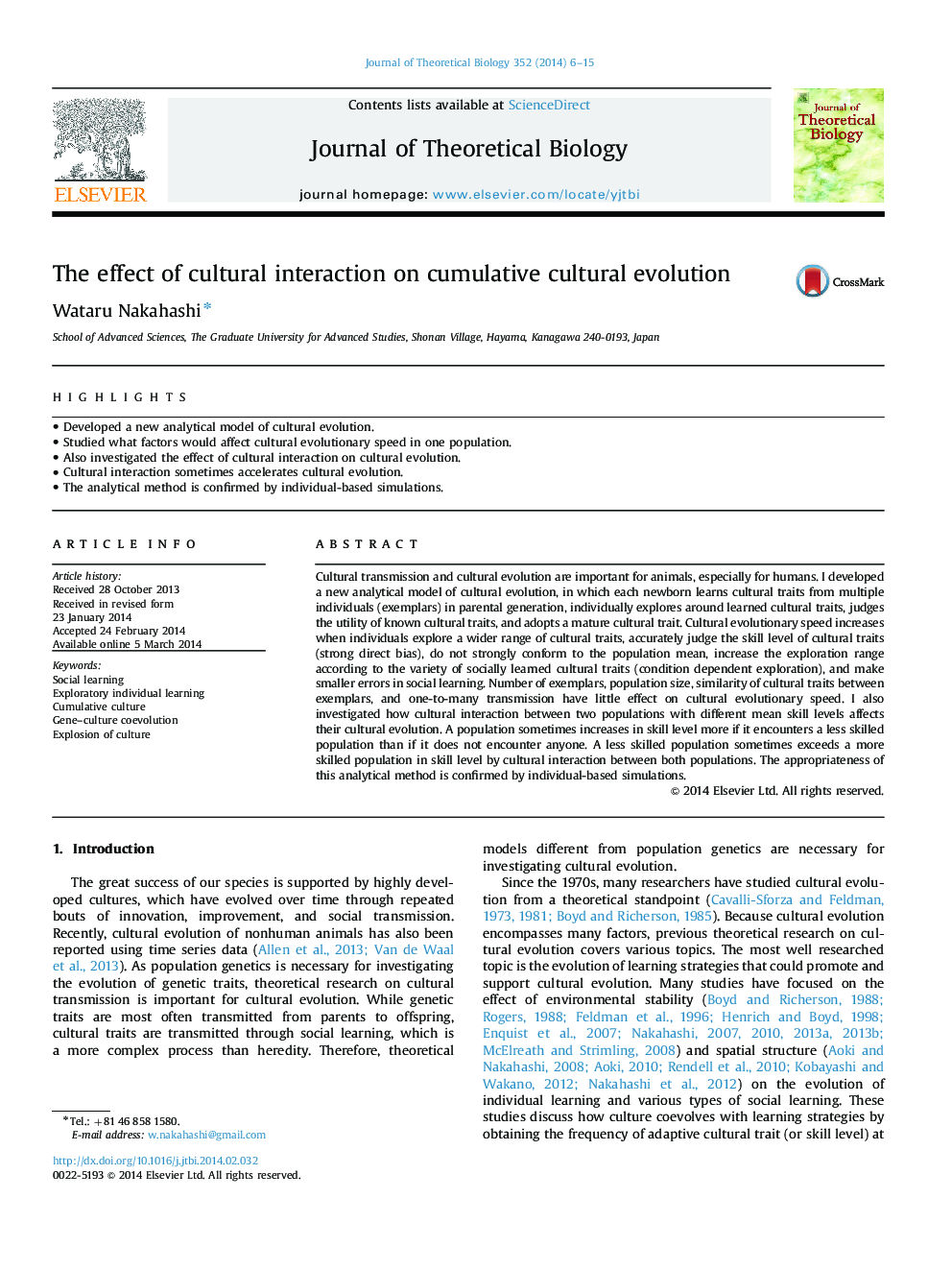| کد مقاله | کد نشریه | سال انتشار | مقاله انگلیسی | نسخه تمام متن |
|---|---|---|---|---|
| 6370446 | 1623858 | 2014 | 10 صفحه PDF | دانلود رایگان |
عنوان انگلیسی مقاله ISI
The effect of cultural interaction on cumulative cultural evolution
ترجمه فارسی عنوان
اثر تعامل فرهنگی بر تکامل فرهنگی تجمعی
دانلود مقاله + سفارش ترجمه
دانلود مقاله ISI انگلیسی
رایگان برای ایرانیان
ترجمه چکیده
انتقال فرهنگی و تکامل فرهنگی برای حیوانات، مخصوصا برای انسان ها مهم است. من یک مدل تحلیل تحلیلی تکامل فرهنگی را توسعه دادم که هر یک از نوزادان از ویژگی های فرهنگی چندین فرد (نمونه) در نسل های والدین یاد می گیرند، به طور جداگانه در مورد ویژگی های فرهنگی آموخته، قضاوت می کنند از ویژگی های فرهنگی شناخته شده، و یک ویژگی فرهنگی بالغ را تصویب می کند. سرعت تکاملی فرهنگی هنگامی افزایش می یابد که افراد طیف گسترده ای از ویژگی های فرهنگی را کشف می کنند، به طرز دقیق قضاوت در سطح مهارت های فرهنگی (تعصب مستقیم قوی)، به شدت با میانگین جمعیت مخالفت نمی کنند، محدوده اکتشاف را با توجه به ویژگی های مختلف فرهنگی اجتماعی افزایش می دهد (اکتشاف وابسته به شرایط)، و اشتباهات کوچکتر در یادگیری اجتماعی ایجاد می شود. تعداد نمونه ها، اندازه جمعیت، شباهت صفات فرهنگی بین نمونه ها و انتقال یک به چند اثر کمی بر سرعت تکامل فرهنگی دارد. من همچنین بررسی کرد که چگونه تعامل فرهنگی بین دو جمعیت با میانگین مهارت های متفاوت بر تکامل فرهنگی آنها تأثیر می گذارد. گاهی اوقات جمعیت در سطح مهارت بیشتر افزایش می یابد، در صورتی که جمعیت کمتری را در معرض دید قرار می دهد تا اینکه با کسی برخورد نکند. یک جمعیت کمتر ماهر از طریق تعامل فرهنگی میان هر دو جمعیت، در سطح مهارت بیش از جمعیت متخصص بیشتر می شود. سازگاری این روش تحلیلی با شبیه سازی های مبتنی بر فرد تایید شده است.
موضوعات مرتبط
علوم زیستی و بیوفناوری
علوم کشاورزی و بیولوژیک
علوم کشاورزی و بیولوژیک (عمومی)
چکیده انگلیسی
Cultural transmission and cultural evolution are important for animals, especially for humans. I developed a new analytical model of cultural evolution, in which each newborn learns cultural traits from multiple individuals (exemplars) in parental generation, individually explores around learned cultural traits, judges the utility of known cultural traits, and adopts a mature cultural trait. Cultural evolutionary speed increases when individuals explore a wider range of cultural traits, accurately judge the skill level of cultural traits (strong direct bias), do not strongly conform to the population mean, increase the exploration range according to the variety of socially learned cultural traits (condition dependent exploration), and make smaller errors in social learning. Number of exemplars, population size, similarity of cultural traits between exemplars, and one-to-many transmission have little effect on cultural evolutionary speed. I also investigated how cultural interaction between two populations with different mean skill levels affects their cultural evolution. A population sometimes increases in skill level more if it encounters a less skilled population than if it does not encounter anyone. A less skilled population sometimes exceeds a more skilled population in skill level by cultural interaction between both populations. The appropriateness of this analytical method is confirmed by individual-based simulations.
ناشر
Database: Elsevier - ScienceDirect (ساینس دایرکت)
Journal: Journal of Theoretical Biology - Volume 352, 7 July 2014, Pages 6-15
Journal: Journal of Theoretical Biology - Volume 352, 7 July 2014, Pages 6-15
نویسندگان
Wataru Nakahashi,
